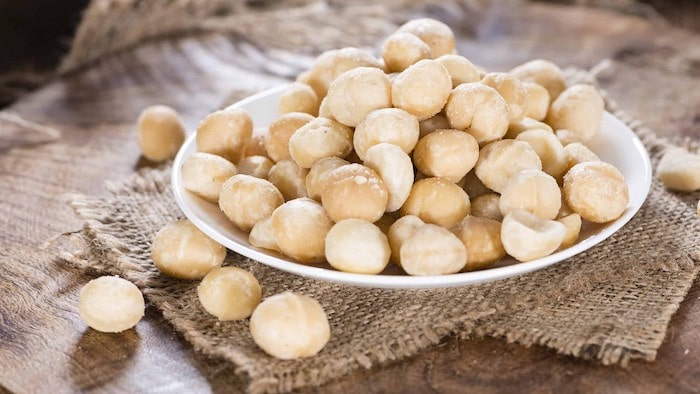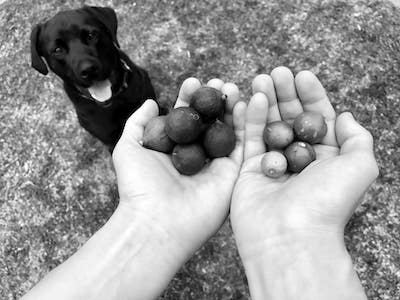Macadamia nuts are a delicious and nutritious snack for humans. They are rich in healthy fats, antioxidants, minerals, and vitamins. They are often used in baking, cooking, and making trail mixes, chocolates, and other treats. But what about dogs? Can they enjoy these nuts as well?
The short answer is no. Macadamia nuts are toxic to dogs and should be avoided at all costs. In fact, they are regularly cited as one of the most toxic foods for dogs, along with grapes, raisins, chocolate, and xylitol.
Even a small amount of macadamia nuts can cause severe symptoms in dogs, such as weakness, vomiting, diarrhea, tremors, fever, and depression. In some cases, these symptoms can be life-threatening and require emergency veterinary care.
In this article, we will explain why macadamia nuts are harmful to dogs, what are the signs of macadamia nut poisoning in dogs, how to treat it, and how to prevent it. We hope that by reading this article, you will be more aware of the dangers of macadamia nuts for dogs and keep your furry friend safe and healthy.
So, let’s crack open the nutty debate and find out if macadamia nuts should be part of your dog’s treat menu.
Symptoms of macadamia nut poisoning in dogs
Clinical signs of macadamia nut poisoning occur in stages. Initial clinical signs of vomiting, fever, and lethargy occur within 3 – 6 hours following ingestion of a toxic dose of macadamia nuts.
The next stage of clinical signs includes a stumbling gait, reluctance to use the rear limbs, inability to stand, joint stiffness, and muscle tremors; these clinical signs occur 6 – 12 hours post ingestion of a toxic amount.

Macadamia nuts are also high in fat, which can trigger pancreatitis or inflammation of the pancreas (a digestive gland located near the small intestine) in susceptible breeds or dogs with a history of pancreatitis.
Severe abdominal pain, dehydration, fever, depression, persistent loss of appetite and vomiting are common clinical signs associated with pancreatitis.
Causes of Macadamia Nut Poisoning in Dogs
The exact mechanism of how macadamia nuts affect dogs is unknown. Veterinarians and researchers have not identified the specific toxin or the biological action that causes the signs of poisoning. However, it is believed that macadamia nuts interfere with the nervous system and muscle function in dogs.
Some possible explanations are:
- Macadamia nuts contain a compound called phytotoxin that may inhibit the activity of certain enzymes in the nerve cells and muscles.

- Macadamia nuts may affect the levels of neurotransmitters such as serotonin and dopamine in the brain and spinal cord.
- Macadamia nuts may trigger an immune-mediated response or an allergic reaction in some dogs.
Whatever the cause may be, the result is that macadamia nuts impair the normal functioning of the nerves and muscles in dogs. This leads to weakness, paralysis, tremors, fever, and other symptoms.
Another possible cause of macadamia nut poisoning in dogs is pancreatitis. Pancreatitis is an inflammation of the pancreas, an organ that produces digestive enzymes and hormones. Macadamia nuts are very high in fat and can cause pancreatitis in some dogs who are sensitive to fatty foods or have a history of pancreatic problems.
Pancreatitis can cause severe abdominal pain, vomiting, diarrhea, loss of appetite, dehydration, and shock in dogs. It can also lead to complications such as diabetes or organ failure if left untreated.
Treatment of Macadamia Nut Poisoning in Dogs
The treatment of macadamia nut poisoning in dogs depends on the severity of the symptoms and the time elapsed since ingestion. The main goals of treatment are to remove the toxins from the body and to provide supportive care to alleviate the symptoms and prevent complications.
Some possible treatment options are:
1) Inducing vomiting: If your dog has eaten macadamia nuts within the last two hours and is not showing any signs of poisoning yet, your veterinarian may advise you to induce vomiting at home. This can help expel some of the nuts from the stomach and reduce the amount of toxins absorbed into the bloodstream.
However, you should never induce vomiting without consulting your veterinarian first, as it may not be appropriate or safe for your dog in some cases.

2) Administering activated charcoal: Activated charcoal is a substance that can bind to toxins and prevent them from being absorbed into the body. Your veterinarian may give your dog activated charcoal orally or through a tube into the stomach. This can help reduce the toxicity of macadamia nuts and other substances that may be present in the food.
3) Giving fluids and electrolytes: Your dog may lose fluids and electrolytes due to vomiting, diarrhea, or overheating. Your veterinarian may give your dog intravenous fluids and electrolytes to restore hydration and balance in the body. This can also help flush out the toxins from the kidneys and prevent kidney damage.
4) Monitoring vital signs: Your veterinarian may monitor your dog’s heart rate, blood pressure, temperature, breathing, and blood tests to assess the severity of the poisoning and the response to treatment. Your dog may need oxygen therapy, anti-inflammatory drugs, painkillers, or anticonvulsants to manage the symptoms and prevent complications.
Prevention of Macadamia Nut Poisoning in Dogs
The best way to prevent macadamia nut poisoning in dogs is to keep them away from human foods that may contain these nuts. Here are some tips on how to do that:
- Store macadamia nuts and foods that contain them in secure containers or cabinets that your dog cannot access.
- Read labels carefully and avoid buying or eating foods that contain macadamia nuts or other ingredients that are toxic to dogs.
- Do not share your food with your dog or leave it unattended where your dog can reach it.

- Educate your family and friends about the dangers of macadamia nuts for dogs and ask them not to feed them to your dog.
- If you have guests over, make sure they do not leave their food or bags where your dog can get into them.
- If you bake or cook with macadamia nuts, clean up any spills or crumbs immediately and dispose of them safely.
- If you suspect that your dog has eaten macadamia nuts, call your veterinarian or the ASPCA Animal Poison Control Center (888-426-4435) right away.
FAQs
Are all dogs affected by macadamia nuts?
While macadamia nuts are toxic to most dogs, it’s important to note that some dogs may be more susceptible to the toxic effects than others. Regardless of breed, it’s recommended to avoid feeding macadamia nuts to any dog.
Are there any safe nuts that dogs can eat?
While macadamia nuts are off-limits, there are a few nuts that can be safe for dogs in moderation. Plain, unsalted peanuts and cashews are generally considered safe options. However, it’s always best to consult with your veterinarian before introducing any new foods into your dog’s diet.
Can macadamia nuts cause long-term damage to dogs?
In most cases, dogs recover fully after the ingestion of macadamia nuts. However, if left untreated or in severe cases, there is a possibility of long-term muscle damage. That’s why it’s crucial to seek veterinary care as soon as possible if your dog consumes macadamia nuts.
What should I do if my dog accidentally eats macadamia nuts?
If your dog consumes macadamia nuts, it’s crucial to contact your veterinarian immediately. They will provide guidance based on your dog’s specific situation and may recommend inducing vomiting or other appropriate treatments.
Final Thoughts
In conclusion, the question “Can dogs eat macadamia nuts?” has a resounding answer: No. Macadamia nuts are dangerous and toxic to our canine companions, and even a small amount can lead to adverse health effects. As responsible pet owners, it’s our duty to keep harmful foods like macadamia nuts far away from our four-legged friends.
If you suspect your dog has ingested macadamia nuts or any other toxic substance, don’t hesitate to contact your veterinarian immediately. Quick action can make all the difference in ensuring your dog’s well-being and a speedy recovery.

Robert is the heart of Dog Needs Best, with his cheerful personality he is not only beloved by our team but also by dogs. He owns multiple dogs and knows ins and outs of them. Finding the perfect product is what he is best at!

